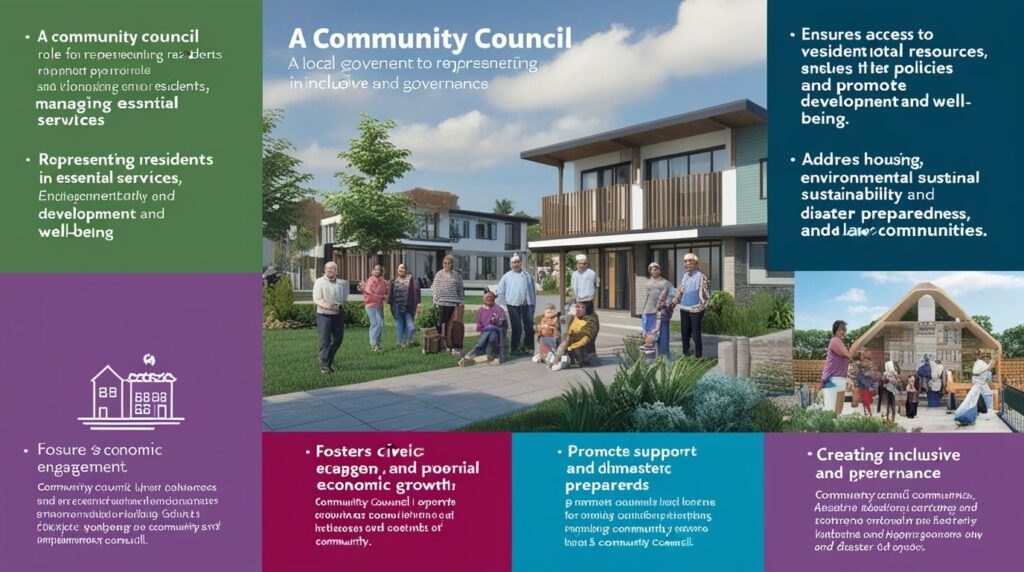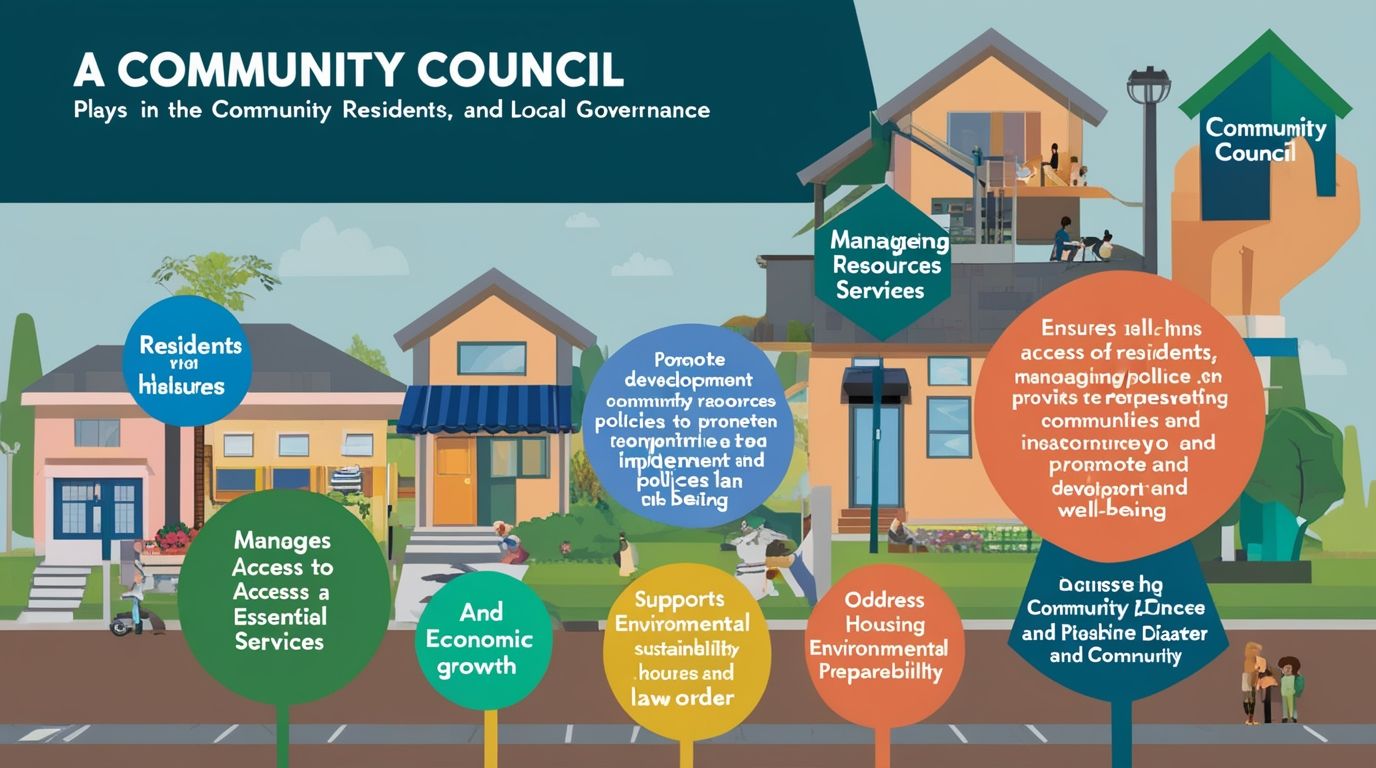The Role of a Council in a Community, A community council serves as the backbone of local governance, providing leadership, direction, and oversight to ensure the well-being and development of its residents. Its primary role is to act as a representative body that addresses the needs and concerns of the community while also managing resources and implementing policies to enhance the quality of life. Community councils play a vital role in fostering a sense of unity, promoting civic engagement, and ensuring that local voices are heard in decision-making processes. Through their multifaceted responsibilities, councils support the development of infrastructure, educational programs, health services, and cultural initiatives that cater to the diverse needs of the population.
One of the fundamental responsibilities of a community council is governance and policy-making. Councils are responsible for creating and enforcing rules and regulations that maintain order and harmony within the community. This includes zoning laws, building codes, and ordinances that guide land use and development. They ensure that these regulations align with broader national and regional policies while addressing the unique requirements of the local area. The council also establishes policies that promote sustainable development, environmental conservation, and economic growth, ensuring that progress does not come at the expense of ecological balance.
Another crucial role of the council is resource management. Effective allocation and utilization of resources are essential for the smooth functioning of any community. Councils oversee budgeting, financial planning, and revenue generation to fund various projects and services. They are tasked with collecting taxes, managing public funds, and ensuring accountability in financial transactions. Transparency in resource management fosters public trust and enables councils to address infrastructure needs, such as road maintenance, waste management, and water supply systems. Additionally, councils often collaborate with private entities and non-profit organizations to secure additional funding and support for community development initiatives.

Community councils also play a pivotal role in social welfare and public services. They are responsible for ensuring access to essential services such as healthcare, education, and emergency response systems. By partnering with healthcare providers, councils facilitate the establishment of clinics, vaccination programs, and health awareness campaigns. They also collaborate with educational institutions to enhance learning opportunities, provide scholarships, and organize skill development programs. In times of crisis, such as natural disasters or pandemics, councils coordinate relief efforts, distribute resources, and provide shelter and support to affected individuals.
Promoting civic engagement and participation is another significant function of community councils. They act as a bridge between the government and the residents, ensuring that public opinions and concerns are taken into consideration during decision-making processes. Councils organize town hall meetings, forums, and public hearings to gather feedback and address grievances. By encouraging community involvement, they empower citizens to contribute to the development and governance of their locality. This participatory approach not only strengthens democracy but also fosters a sense of ownership and responsibility among residents.
Cultural and recreational development is also a focus area for community councils. They play an instrumental role in preserving local traditions, promoting cultural activities, and organizing events that celebrate diversity. Festivals, exhibitions, and sports tournaments organized by councils enhance social cohesion and create opportunities for interaction among residents. These activities also promote tourism and generate revenue, contributing to the economic growth of the community. Moreover, councils often invest in parks, libraries, and recreational facilities to provide spaces for relaxation and leisure, thereby improving the overall quality of life.
The council’s role extends to maintaining law and order within the community. While they do not directly enforce laws, councils work closely with law enforcement agencies to ensure safety and security. They assist in crime prevention by supporting neighborhood watch programs and promoting awareness about safety measures. Councils may also mediate disputes among residents, ensuring that conflicts are resolved amicably. Their involvement in maintaining peace and harmony is vital for creating a conducive environment for growth and development.
Economic development and job creation are key areas where councils make a substantial impact. They formulate policies to attract investments, support local businesses, and encourage entrepreneurship. By providing training programs, financial assistance, and networking opportunities, councils help individuals and businesses thrive. They also advocate for infrastructure development, such as transportation networks and communication systems, which facilitate economic activities and create employment opportunities. In rural areas, councils often promote agricultural development and provide resources for farmers to improve productivity and market access.
Environmental sustainability is another critical responsibility of community councils. They implement programs and policies aimed at protecting natural resources, reducing waste, and promoting renewable energy. Councils organize tree-planting drives, recycling programs, and clean-up campaigns to raise awareness about environmental conservation. They also monitor industrial activities to ensure compliance with environmental regulations, mitigating the impact of pollution on the community.
Community councils also address housing and urban development issues. They work towards providing affordable housing solutions, improving living conditions, and reducing homelessness. By collaborating with architects, planners, and developers, councils ensure that urbanization projects are well-planned and inclusive. They focus on creating smart, sustainable communities that cater to the needs of all residents, including the elderly and disabled. Efforts to improve public transportation and pedestrian-friendly infrastructure further enhance accessibility and mobility within the community.
Disaster preparedness and emergency management are areas where councils play a proactive role. They develop contingency plans, conduct drills, and establish communication networks to respond effectively to emergencies. Councils also coordinate with relief agencies and volunteers to ensure timely assistance during disasters. Their preparedness and responsiveness significantly reduce the impact of crises and help communities recover quickly.
In addition to these responsibilities, councils play a role in fostering inclusivity and equity. They advocate for the rights of marginalized groups, including minorities, women, and people with disabilities. Policies and programs designed to address discrimination and promote equality are central to their mission. Councils also support initiatives that enhance social integration, such as language training programs for immigrants and accessibility improvements for differently-abled individuals.
The role of a council in a community is multifaceted and dynamic, requiring a balanced approach to governance, planning, and service delivery. By addressing the diverse needs of the population, councils ensure sustainable growth, social harmony, and improved quality of life. Their ability to adapt to changing circumstances, engage with residents, and collaborate with stakeholders makes them indispensable to community development. As the world continues to evolve, community councils will remain a vital institution, driving progress and fostering resilience in the face of challenges.

12 thoughts on “The Role of a Council in a Community”
Comments are closed.